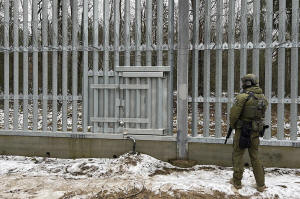Poland wants the EU focused on security. Its border with Belarus
highlights the challenges
 Send a link to a friend
Send a link to a friend
 [January 20, 2025]
By LORNE COOK [January 20, 2025]
By LORNE COOK
POLOWCE, Poland (AP) — Poland's six-month presidency of the European
Union is firmly focused on security. As Europe’s biggest land war in
decades rages, fewer places highlight the challenges and contradictions
of defending the bloc and its values more starkly than the border with
Belarus.
Some 13,000 border guards and soldiers protect around 400 kilometers
(250 miles) of border. It’s become a buffer zone since Belarus’ ally,
Russia, invaded neighboring Ukraine three years ago. Similar
fortifications farther north line Poland's frontier with the Russian
region of Kaliningrad.
Poland is Ukraine’s top logistical backer. Most of the Western-supplied
arms, ammunition and equipment helping to keep Ukraine’s armed forces
afloat transit through. Russia, meanwhile, uses Belarus as a staging
ground for its invasion.
At the border near the town of Połowce, a 5.5-meter (18-foot) steel
barrier strung with razor wire and topped by security cameras separates
once-friendly communities that war has turned into wary rivals. Drones,
helicopters and armored vehicles keep watch.
The border crossing is closed. Around 40 border guards and troops could
be seen on Jan. 16, when the Polish EU presidency invited 60 reporters
from international media to witness the security effort.
The road was strewn with layers of concrete obstacles and concertina
wire likely to dissuade an advancing army. Border guards peered into
Belarus.

It’s needed, the government in Warsaw says, because Russia and Belarus
are waging a particular kind of hybrid warfare: helping groups of
migrants — mostly from Africa or the Middle East — to break through the
border to provoke and destabilize Poland and the rest of Europe.
“We have tightened our visa policy, and above all we have decided to
suspend the right to asylum wherever we are dealing with mass border
crossings organized by Belarus and Russia,” Prime Minister Donald Tusk
told reporters on Friday.
When migrants are equated with danger
Almost 30,000 attempted border crossings were spotted last year. Most
are young men, often from Ethiopia, Eritrea and Somalia. Polish
authorities say they arrive in Belarus on tourist or student visas and
are helped across for a fee ranging from $8,000 to $12,000.
Poland says they’re assisted by the Belarus security services and other
“organizers.” They're mostly Ukrainians, perhaps fallen on hard times
since fleeing the war. They can earn $500 for each person they help,
border officials say.
Border guards claim to be routinely attacked. One guard was killed last
year and several injured.
They say that migrants shoot slingshots, throw small explosives or
rocks, or use pepper spray on guards. More than 400 incidents were
recorded last year in this section of the border, with 307 people
hospitalized.
The deputy commander of the Podlaski border guard division, Col. Andrzej
Stasiulewicz, said the migrants are hard to discourage. “Warning shots
don’t work, so force is needed,” he said. Reporters were shown video and
photos purported to show migrants assailing the border.
Stasiulewicz said their actions are “very unpredictable, and very
precise and coordinated.”
Medical aid group Doctors Without Borders paints a different picture.
The charity says it's treated more than 400 people since November 2022,
“many of them stranded for weeks in uninhabitable forests and exposed to
violent practices at the border.”
People suffered from exhaustion, hypothermia, dehydration and mental
health issues. Last year, it noted “a sharp increase in people carrying
the scars of physical assaults, including bruises and dog bites.”
It’s almost impossible to independently verify such reports. The area is
off limits. NGOs and media must apply for a permit to enter. EU and
international agencies that work with migrants are not invited either,
although migrants are provided with their contact details should they
want to complain.
[to top of second column]
|

A Polish border guard looks east into Belarus at the crossing point
Połowce-Pieszczatka in Polowce, Poland, Thursday, Jan. 16, 2025. (AP
Photo/Lorne Cooke)

“Turnbacks” not “pushbacks,” Poland insists
Stasiulewicz said those who force their way in “are sent back to
Belarus, which is in line with our legal framework.”
The Norwegian Refugee Council, a migrant aid charity, has another
take. It said that nearly 9,000 “violent pushbacks ” have been
reported by NGOs in what it describes as “Europe’s death zone” since
2021.
Pushbacks – depriving someone who may be in fear for their safety of
their right to apply for asylum – are illegal under international
law.
Polish Undersecretary of State Maciej Duszczyk rejects the pushback
allegations. He prefers "turnbacks.” The rationale is that migrants
are obliged to apply for asylum in good faith at open border points,
not force their way in.
The nearest place they can do that is in Terespol, about 100
kilometers (60 miles) south of Połowce.
Halting asylum in the name of security
As far as the Polish authorities are concerned, their methods are
working. The number of people arriving in Połowce has dropped
significantly. Around 670 people applied for asylum there last year,
and none to mid-January. The Office for Foreigners was empty when
reporters visited.
To keep numbers down, the government intends to suspend asylum
applications in times of crisis.
A draft law winding its way through parliament would see the border
shut for 60 days if Warsaw suspects that migrants are being
“weaponized” — should they approach the border in large groups, try
to intimidate Polish officers or damage border infrastructure.
“If anyone uses violence against the border guards, we close the
border,” Duszczyk said.
Doctors Without Borders says this could have “dramatic
consequences.” It’s urged Poland “to drastically change course of
action" and do all it can to protect migrants and refugees.
But EU leaders signed off on Poland’s actions at a summit last
month. Countries on Europe’s eastern flank received a greenlight to
suspend the right to protection when they believe that Belarus and
Russia are “ weaponizing” migrants.

When security and migration get political
Ultimately, security and migration policies are highly politicized.
Tusk has been in power for more than a year but his party’s
candidate in a presidential election in May faces a strong challenge
from a nationalist opponent.
The EU shifted further right in June after elections to the European
Parliament, with nationalists and populists shaking Europe’s
foundations, particularly in major powers France and Germany. Tusk
believes that tough migration policy can win back voters.
“If we do not want to hand over these matters to radicals,
extremists, populists, we must find the right answers so that no one
in the world doubts that democratic states are able to effectively
defend themselves against illegal migration,” he said on Friday.
He described the “tough protection" of borders as a "sacred duty.”
Poland’s borders also make up the 27-nation EU’s external frontier.
For Tusk, his country’s security is Europe’s security. It's a
similar argument made by Hungary's staunchly nationalist prime
minister, Viktor Orbán.
___
Associated Press writers Monika Scislowska and Vanessa Gera in
Warsaw contributed to this report.
All contents © copyright 2025 Associated Press. All rights reserved |